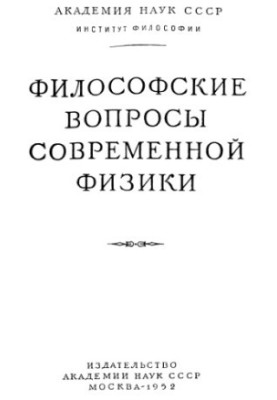Philosophical Issues of Modern Physics
 Instant download
Instant download
after payment (24/7)
 Wide range of formats
Wide range of formats
(for all gadgets)
 Full book
Full book
(including for Apple and Android)
The Philosophical Questions of Modern Physics, edited by A. A. Maximova is an exciting and in-depth study at the intersection of science and philosophy, which opens up new horizons for the reader to understand both physics and the very nature of human knowledge. This collection of articles by eminent scientists and philosophers addresses key issues arising at the boundary between physical theories and philosophical concepts, making it indispensable for anyone interested in both science and philosophy. The complex questions raised in the book relate not only to the theoretical aspects of physics, but also to broader existential topics. For example , What are the limits of our understanding of the universe? What are the philosophical implications of quantum mechanics and the theory of relativity? How do scientific discoveries affect our perception of reality and of man's place in the world? These and many other questions become the subject of discussion in the Philosophical Issues of Modern Physics, What Makes a Book Relevant to Students , [CM ) Post-graduate students and all , students: , [CM Who wants to know more about ,? how physics interacts with philosophy. The book will be especially interesting for those who are fond of science and philosophy, as well as for those who are looking for answers to complex questions about the nature of reality. It is suitable for both students and teachers of physics, and for philosophers interested in the problems arising from scientific discoveries. Readers who like to reflect on how science is changing our perception of the world will find plenty of food for thought in this collection. The topics raised in the book cover a wide range of issues, including the nature of time, space, causality, and randomness. The authors discuss how modern physical theories can change our understanding of these concepts and how philosophical ideas can help in the interpretation of scientific results. This interaction between science and philosophy makes the book particularly valuable, as it shows that science does not exist in a vacuum, but is part of the larger picture of human knowledge. The style of writing of the authors is characterized by accessibility and clarity, which allows readers without special training to immerse themselves in the topics discussed . The book is filled with examples from the history of science and philosophy, which makes the material more lively and fascinating. A. A. Maximov, as an editor, is known for his work in the field of philosophy of science, and his experience allows him to create a harmonious and logically structured work that will be of interest to both specialists and a wide audience. If you’re looking for books that touch on the philosophical aspects of science, you might like such works as Carl Sagan’s Cosmos or Mitio Kaku’s Physics of the Impossible. These books, like The Philosophical Questions of Modern Physics, explore the boundaries of human understanding and ask important questions about the nature of reality. In conclusion, “Philosophical Issues of Modern Physics” is not just a collection of articles, but a real intellectual laboratory where the ideas of science and philosophy intersect. This book will be an indispensable resource for anyone who seeks to understand how physics shapes our perception of the world, and how philosophy can help us make sense of these changes. Do not miss the opportunity to immerse yourself in this fascinating world of ideas, which can change your idea of science and life in general.
LF/899555013/R
Data sheet
- Name of the Author
- Максимов А.А.
и др. (ред.) - Language
- Russian
- Release date
- 1952



























